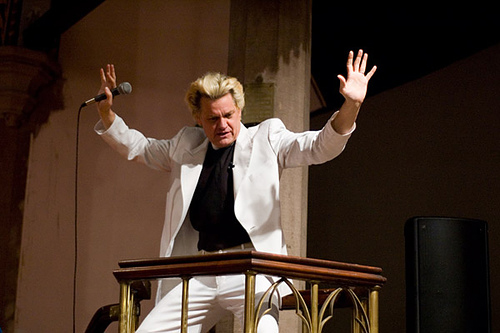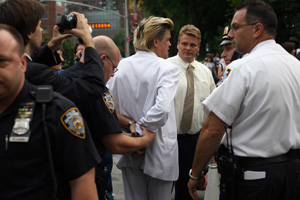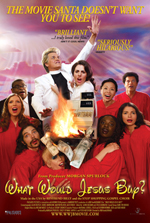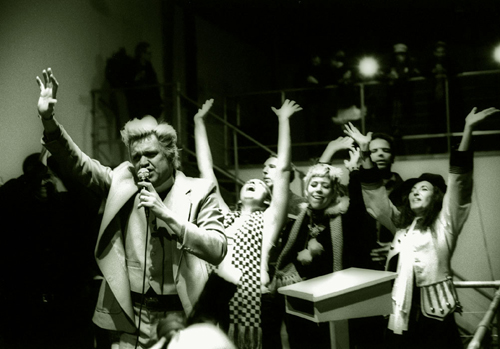OldSpeak
What Would Jesus Buy? An Interview with Reverend Billy and Savitri Durkee
By John W. Whitehead
November 28, 2007
Do not store up for yourselves treasures on earth, where moth and rust destroy, and where thieves break in and steal. But store up for yourselves treasures in heaven, where moth and rust do not destroy, and where thieves do not break in and steal. For where your treasure is, there your heart will be also.—Jesus
The United States is dominated by a consumer culture. Everywhere we turn, we are bombarded with advertisements: in newspapers and magazines, on the internet, on television, in movies, on billboards—even on our mobile devices. Stadiums, sports teams and buildings are selling corporate entities the rights to their names.
American culture is being overwhelmed by mass commercialization. Large corporations now dominate the scene. Giant retailers have moved into smaller towns and cities, subsuming mom-and-pop businesses and corner stores. In the process, much of community life, not to mention the environment, has been destroyed by the profit-driven policies of the corporate giants.
Nothing is sacred anymore. Even Christmas, a time that should be spent pondering the meaning of peace and restoring relationships, is dominated by greed and crass commercialism.
While many bemoan the emphasis on materialism and mass consumerism, William Talen is one of the few who has dared to do something about. Talen has been preaching an anti-consumerist message on the streets of New York since the late 1990s. After moving to New York from San Francisco, he became increasingly wary of the trend of commercialism in Times Square that came with then-Mayor Rudy Giuliani’s “improvements” and decided to take action.
Having gained a reputation as a performer and producer, Talen turned to evangelical gospel preachers for inspiration in creating his most memorable role of all: Reverend Billy. What began as a solo act has since expanded into a full-fledged movement to combat the rampant consumerism that plagues American society. The Church of Stop Shopping, as it is now called, is a non-profit organization and performance group that includes William Talen as Reverend Billy, theatrical director Savitri Durkee (Reverend Billy’s wife), a 34-member gospel choir and an 8-piece “Not-Buying-It” band. The message of the Church of Stop Shopping has since broadened to include the causes of economic justice, environmental protection, anti-militarism, protesting sweatshops and recently protesting the Iraq war.

Although Talen’s “Reverend Billy” persona started off as a character, he has moved beyond parody to become what many consider the real deal. From his “pulpit,” Reverend Billy urges Americans to resist the culture of consumption and all its damaging effects on the environment, small businesses, culture, community and individuals. Some of his favorite targets include Disney (his protests began outside a Disney store), Starbucks, Wal-Mart and Victoria’s Secret, just to name a few. Incited by unfair labor practices (including child labor), displacement of local businesses and mass-consumer appeal, Reverend Billy has famously staged demonstrations—or “interventions”—at several locations throughout New York City and other areas of the country, some resulting in arrests. And the Church of Stop Shopping called for a national “Buy Nothing Day” on Friday, November 23, a day traditionally marked by huge sales and mass shopping as the first of the Christmas shopping season.
Preaching a message of “buy less and give more,” Reverend Billy and the Church of Stop Shopping took their show on the road, embarking on a cross-country tour that concluded with a musical anti-Disney march down Disneyland’s Main Street in late 2005. They’re now featured in a new film documentary covering this journey and others. What Would Jesus Buy? is produced by Academy Award-nominated filmmaker Morgan Spurlock and directed by Sundance award winner Rob VanAlkemade. The film focuses on materialism—specifically the commercialization of Christmas, large corporations and their harmful effects on society and globalization. It premiered in New York, San Francisco and Los Angeles on November 16, 2007. Taking a short break from their protesting and promoting, Billy and Savitri sat down to talk to me about their mission, their movement and their new movie.
 JW: You’ve been arrested many times. You practice civil disobedience. Some of the great classic figures of the past such as Martin Luther King have used civil disobedience arrest to proclaim their message. Is that part of your theater?
JW: You’ve been arrested many times. You practice civil disobedience. Some of the great classic figures of the past such as Martin Luther King have used civil disobedience arrest to proclaim their message. Is that part of your theater?
Savitri: Yes, it absolutely is. What would separate our work from those amazing movements of the past is that public space is no longer accessible to most people. There are many places in this country where you really have to be shopping in order to be in public space. Thus, I believe we have an additional challenge now just to occupy public space. What Billy and I do with the church, the choir and our supporters is try to open up public space. We’re trying to redefine what public space is. If the corporations are going to insist on shuttering our downtowns and our main streets and then reinventing those commons inside their stores, they have to allow those to be public spaces. That is at the heart of our work as well.
JW: We’ve defended people who have handed out literature in shopping mall parking lots and been arrested. Those are tough cases. What used to be public space is being bought up by the corporate hierarchy. Sooner or later, the corporations are going to argue that almost everything is “private” property, and, therefore, we have no rights to free expression. Do you see that coming?
Rev. Billy: Yes.
 JW: Your new documentary is What Would Jesus Buy? Naturally, the question is: What would Jesus buy?
JW: Your new documentary is What Would Jesus Buy? Naturally, the question is: What would Jesus buy?
RB: Jesus, we believe, would buy less and give more.
JW: Do you really think he would buy anything at all? As I’ve read in the New Testament, whenever he had to demonstrate, for example, whether to pay taxes or not, he had to ask for a coin. The idea is that Jesus didn’t have any money. Thus, would Jesus buy anything?
RB: The title of the documentary is more or less a trick question. It extends people into conversations like the one we’re having right now. Morgan Spurlock was the one who came up with it. But it comes out of a tradition of asking similar questions. For example, what would Jesus drive? What would Jesus do? In fact, at the beginning of the Iraq war, some were asking, “Who would Jesus bomb?” It has been a folk vernacular shifting through time. But you’re right. We don’t have any evidence of Jesus purchasing anything at any point. As it says in the film, the single time we have evidence that he got a little bit pushy—one might say violent—was Jesus’ response to the money changers in the Temple.
S: The question really demonstrates what a gift is. There are so many stories of Jesus giving things away without purchasing them. It illustrates another point, which is that you don’t have to buy a gift to give a gift. That is really the ultimate message of our film. The greatest gift is the one you may already have. It might be right beside you or inside you. Your time or your love. Give your kids your undivided attention for an hour or so. I think that is really what we have to learn from Jesus. It is the power of a gift.
JW: Why did you choose to wrap your message in a Christian parody?
RB: It was originally a parody. But then some time around 9/11, Reverend Billy became simply a pastor. I think it’s important not to be ordained or attend divinity school. But there is also a history here. Reverend Sidney Lanier was a friend of Lenny Bruce and Tennessee Williams and was a figure in the New York theater world in the 1950s and 1960s. Reverend Lanier was the Vickar at St. Clements Church near Times Square where I was working when I began my sidewalk preaching career in front of a Disney store. Sidney, for a long time, had a tutorial relationship with me. He would give me a book every week, and we would read it together and discuss it. That is how I came into it. There was the idea that we should try to invent, to use Sidney’s phrase, a new kind of American preacher.

JW: But why would you have to do that? Are the preachers in this country generally failing America? Why does someone like you have to step into a vacuum and preach this important message?
RB: We believe in the God that people who don’t believe in God believe in. There is a pastoring to many different kinds of people here in New York City. It is to many kinds of immigrant citizens who have backgrounds in different faiths. We have people with backgrounds in different faiths in our choir. We have people from all over the world in our choir. It’s like a New York subway car. It is an ecumenical community. But at the very beginning in the late 1990s, there was a parody of the 3 a.m. televangelist on Trinity Broadcasting Network. People are reminded of Jimmy Swaggart by my style.
S: Let me add one thing. It is an interesting question that you ask about stepping into a vacuum. I wouldn’t say there is a personality vacuum amongst the existing preachers at all or a vacuum of faith necessarily. But certainly there has not been a large cultural conversation about shopping, and it seems like the most direct way that we express our values is through shopping. That is the vacuum we step into. It is the lack of conversation about the very basic thing we do all day, which is shop and spend money, and how that reflects our moral center. That is certainly something we’re talking about. We want to talk about it with everyone because it is so important right now.
JW: One of the first things George Bush told the American people to do after 9/11 was go shopping. What is wrong with shopping? What is wrong with consuming goods? What is wrong with filling up your life with items? When I go into a mall, I see people walking around comatose with headphones on and the ever- present cell phone crammed to their ears, walking in and out of the stores with bags. What does all that mean? Does it go to the heart of what you’re trying to say in your documentary?
RB: Yes, it does. That is well put, and it is sad. It is the isolation of people from one another when we are surrounded by products that we are concerned about. It is the mediation of our experience through a corporate gadget or through packaging advertising. These environments are making individuals farther from each other, and that is just one aspect. It is such a gigantic critique of what America has become that one hesitates to know where to begin. I find myself falling back on, “Well, let’s speak about us as citizens again, not consumers.” It turns out that being a consumer on this level is not a neutral thing. It is not an act of freedom or prosperity future in America. It is not about youth, status and sex. The products tell us that it is a choice and that you simply acquire the service and pleasure of a certain product. It turns out that there is a tremendous forceful momentum of prejudice. You end up living your life in a much different way. And as a group, we end up changed as a culture. We have become increasingly involved with consumption. I believe we make decisions in different ways now.
JW: We’ve lost a sense of community in this country.
RB: It has changed our political landscape decidedly.
S: Yes, and the loss of community is nearing absolute in many places.
RB: The local economies are devastated.
S: Just to reach across and discuss what is actually happening in your community is often impossible for people right now.
RB: Once you convert over to buying less and giving more—the Jesus idea—a whole new economy kicks in. It is the one that has been destroyed by the big box machine. Ultimately, what we are trying to get back to is a diverse economy, one that comes from real people and their needs and desires on the ground—one where people are actually talking to each other. We read recently that there is a resurgence of companies that have 100 employees or less in this country. And it seems like there might be a resurgence of neighborhoods and main streets.
S: I grew up in the Charlottesville/Batesville, Virginia area. As a child, I remember that we would go to Page’s store, which was 100 years old. We had a charge account there and would go in after school to get candy. We would have a whole conversation about whether or not we had enough candy. But it wasn’t our mothers having that conversation with us, it was the Pages, who were becoming part of our life and instructing us. They were teachers to us. And all of that centered on their decision of whether they were going to let us charge candy that day. This kind of intimate economy, the exchange of goods, is not in itself a bad thing. Obviously, that is not what we mean when we say stop shopping.
JW: You’re talking about the structure of relationships.
S: Exactly.
JW: Billy, there is a revealing statement in your film when you say, “We are all in SUVs on our way to a television set.” What do you mean by that?
RB: That was the sermon in Dallas after a difficult exorcism at the front door of Wal-Mart. I was trying to characterize the evil, trying to characterize the essential moment when we have lost our soul. We are all in an SUV on our way to watch television.
JW: Have we lost our souls?
RB: Yes. We have to stop those SUVs and just walk off the highway. We have to do something radical that is counter-intuitive and quite beyond what we think makes sense. It is a moment in our culture when the revolution will be foolish.
 JW: Do you think we need a foolish revolution?
JW: Do you think we need a foolish revolution?
RB: Yes.
JW: So you are trying to start a revolution through parody?
RB: I don’t think parody is the right word. I think Saturday Night Live is a tradition of doing parody of religious figures like the church lady and so forth.
JW: Is Reverend Billy now your life? Not a job, but your life?
RB: It is our life. My wife Savitri and I lead a church. It has its own life, and we’ve tried to be of service. It has been surprising. We have fabulous worship services that are 90 minutes long. The parody just isn’t there anymore. We have people who might be shouting “hallelujah” for the very first time in their lives. I might feel that parody for a moment, but it is a matter of seconds. We are in the process of discovering the spirituality that is there for us when we back away from products.
S: Billy talked about the change that took place after 9/11. There was a demand, literally, from the community that Billy step up as a pastor who was serious with them. And the irony and the parodic element fell away to a large degree. After 9/11, we started to have repeat audiences. You could even call them congregations. It was the same few hundred people coming to everything. They really take it seriously as a faith and as a value system they can live with.
JW: In your film, you state that it is illegal in some countries to advertise and market to children. But in this country, we spend over $15 billion marketing toward them. How can parents keep this stuff away from their children when big corporations spend so much money to get it in front of them? What can parents do?
RB: This is one of the biggest themes of the film.
S: It’s a tremendous act of discipline for parents. It requires an almost steel nerve to say no to children. The advertisements are designed to make children nag their parents. That is the whole mechanism of the current advertising model. What does that take from a parent? You have to know absolute discipline. There are many parents who have two or three jobs. They’re already exhausted. And the last thing they need is to have this other layer of work, which is to defend their home and their private world from commodification. It is an incredible challenge for anyone right now.
JW: Is the advertising industry demonic?
RB: We call it that, even while there is that touch of comedy.
JW: Is it really comedy? If there is a Satan, for example, what a great tool the advertising industry is. It is used to suck little kids into being materialists, all the while debunking spirituality.
RB: The idea of a displacing, hypnotizing presence in your life that controls you addictively is an identified evil for people around the world. The question is, how do we counter it in this society? Humor and music are two ways we’ve discovered. We are always looking for a strong counter-expression. But these advertising and marketing departments have been paying experts in psychology very well for decades to discover the mechanics of our desires. The idea is to find out how corporations can advertise in such a way that we can barely resist their products.
JW: So they are manipulating the average American?
S: Yes, very much. The remarkable thing is that although people are so sophisticated about it, they are still completely victim to it. Everyone knows what advertisers are doing to them. Every single person you talk to will acknowledge that this is happening and still fall victim to it. What we have to do is strengthen the resolve that allows a person to not only see through the advertising, but resist the advertising.
JW: Thus, we should just say no to shopping?
S: Yes.
RB: That is what we say. That is the name of our church—the Church of Stop Shopping. But it leaves it open as to the meaning of the phrase—that is, shop for a day or buy nothing or do a one-day fast. It is a cultural fast that we suggest you join. But we have to at least pause and grow our own consciousness so that we have some better control for ourselves and our children.
JW: Much of Americans’ spending dollars are going toward purchasing toys and clothing made by people in third-world countries. In order to produce these luxury items, they work under horrifying conditions—burning their skin, 20-hour shifts, getting paid 13 cents an hour and literally working their fingers to the bone. What companies are among the worst human rights violators? How can Americans who wish to buy only goods made by people being paid a legitimate wage and provided safe working conditions get this information?
S: Some stores are responding when people request and demand that clothes be made in worker-protected environments. But there is a tremendous amount to be done by just simply demanding it from the stores. These stores don’t have to work that way. Wal-Mart could have a different model and reduce their profits just minimally. Thus, it is about consumers demanding a different model.
RB: Now is certainly a good time to pressure companies because they are afraid. The climate crisis has made them all green. Companies are putting forth the image that they’re green now. They are trying to turn the corner.
JW: For the profit motive?
RB: It’s a good time for Americans to state their value system at the point of purchase. That would be the consumer’s version of our cash register exorcism—when we go in stores and drive the demons from the cash registers. You go up to the cash register and ask, “Is this coffee fair trade coffee?” If they look at you with a blank expression on their face, you know the process may begin where you are educating them about what fair trade is. Up the line, a person at the point of purchase might talk to a middle manager, for instance, and say, “Well, a couple people are asking about fair trade coffee. They claim that the profit margins are pretty much the same but that there isn’t suffering at the other end of the supply loop.”
S: We have to educate each other because the media is not going to educate us about this. They’re bought and sold and owned by the corporations. It is up to us to talk to each other, regardless of the media, about these things. Tell your brothers and sisters, your sister’s friends, your children and the parents of your children’s friends. We have to talk about it as a community, and we have to decide together that we have a value system we can live with.
JW: In reading the New Testament, it is clear what Christ taught. He said, “What does it profit a man to win the world and lose his soul?” And, “Don’t store up treasures on earth.” Jesus was anti-materialism. He was into the actual spiritual nature of his religion. In churches across the country, there is a huge movement called the prosperity gospel where preachers and televangelists advocate wallowing in materialism. They tell people they’re to get rich and store up goods. Thus, aren’t the Christians a large measure of the problem here?
RB: I would agree that prosperity Christianity often appears to be in conflict with the teachings of Jesus. I think you are right.
JW: If every Christian church in this country would join with Rev. Billy and return to the real Christmas message, things could change. But you’re out there doing their job for them.
S: It’s a question of abundance. But what is abundance? Is it in your heart? Is it in your relationship to God or nature? Or is it in how many things are under your Christmas tree? To me, abundance is the relationship I have with my life and my spirit. It doesn’t matter what I have outside of my body. That is just not the point. Thus, yes, absolutely, let’s all find that real abundance.
JW: When all is said and done, how should we celebrate Christmas? What would be your recommendation on Christmas day?
RB: Buy less and give more.
JW: Give what?
RB: Your time. To some, when we say give your loved ones your love and your time, it doesn’t seem to have the flair. It doesn’t have the packaging. Going into my closet and finding the stuff that has been in there for years that I had forgotten about or finding a song or a poem within me, as part of our consumerism, we are taught that is not as interesting somehow. In our church, we believe that our souls and our bodies and our immediate loving relationships exist without the products and without the mediation of corporations. Just us as colorful, complex and fascinating people. The discovery of gifts in the foreground of what you would say is your ordinary life actually is extraordinary. But you have to slow down. We need a slow gift movement. We appeal to people to join the slow gift movement. Let yourself be the creative force. Let yourself be the producing force.
S: Or maybe you are the gift.
RB: Yes, you may be the gift yourself.
DISCLAIMER: THE VIEWS AND OPINIONS EXPRESSED IN OLDSPEAK ARE NOT NECESSARILY THOSE OF THE RUTHERFORD INSTITUTE.


